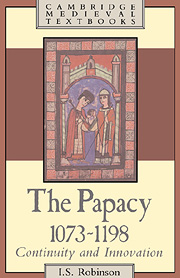Book contents
8 - The political ideas of the papacy
Published online by Cambridge University Press: 05 June 2012
Summary
Who is not aware of the voice of our Lord and Saviour Jesus Christ saying in the Gospel, ‘you are Peter, and on this rock I shall build my Church and the gates of hell will not prevail against it; and I shall give you the keys of the kingdom of heaven, and whatever you bind on earth will be bound in heaven and whatever you loose on earth will be loosed in heaven’ [Matthew 16. 18–19]? Surely kings are not excepted here: or do they not belong to the sheep which the Son of God committed to St Peter? … Is he to whom the power of opening and closing heaven has been given, not permitted to judge the earth? Far from it!
The political authority of the papacy was emphasised for the first time in the polemical writings of the papal reform movement. The reformers realised that they could not enforce their programme without the support of secular rulers. Only kings had the power to ‘restore the health of the whole ecclesiastical order, which is failing even to extinction, and reforge this age of iron into gold with the hammer of righteous rule’: that is, to eradicate simony and clerical marriage from the Church. It was the failure of kings to discharge this duty which prompted Gregory VII to claim an active role in the politics of western Christendom: ‘since there is no prince who troubles himself about such things, we must protect the lives of religious men.’
- Type
- Chapter
- Information
- The Papacy, 1073–1198Continuity and Innovation, pp. 295 - 321Publisher: Cambridge University PressPrint publication year: 1990
- 1
- Cited by



